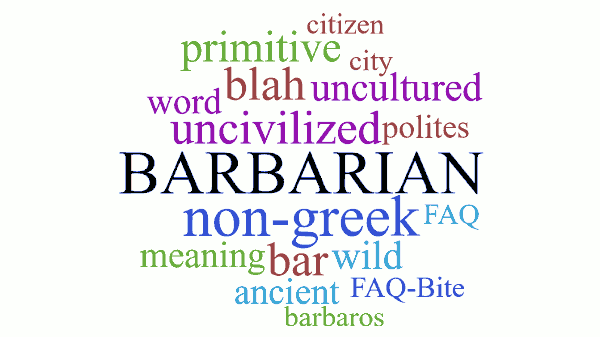Who Were the Barbarians?
Get answers to:
- Where does the word Barbarian come from?
- What was an ancient Greek citizen called?
- Why did the ancient Greeks call them Barbarians?
We get the word from the ancient Greeks, but there is no specific, single group of people who can be identified as Barbarians.
The ancient Greeks divided the peoples of the ancient world into Greeks and non-Greeks. People who were not Greek citizens were called barbaros (βάρβαρος) – foreigners. Barbaros is an onomatopoeic1 play on bar bar (βαρ-βαρ). Essentially, the ancient Greeks thought people speaking foreign languages sounded like they were saying “Bar bar bar.” In English, we we might say something like, “I don’t understand anything they are saying. It all sounds like, ‘Blah blah blah.’”
The ancient Greeks also considered themselves to be the only properly civilized people in the world. They recognized that other people had civilizations, but those civilizations were either corrupt or fell short of the Greek ideal. A Greek citizen was known as a polites2 (πολίτης) – citizen of a city-state – which comes from the root polis meaning city and the modifier ites meaning member of.
The Greeks also used the word xenos (ξένος) for foreigners, but this tended to be used for foreigners living in Greek city states. The term barbaros was reserved for those “uncivilized, unintelligibly babbling” foreigners in foreign lands.
Later, the Romans conquered Greece and appropriated much of its culture. They also took this word, Latinized it to barbarus and expanded the definition of civilized people to include Romans. So all non-Greek and non-Roman people were considered barbarus – uncivilized foreigners.
Today, Barbarian is used to describe someone who is uncivilized or primitive.
- Onomatopoeia is a word that tries to imitate a sound. Examples include grrr and meow. We also got that word from the Greek.↩
- The English word polite does not come from the Greek polites (even if it has the connotation of civilized). The word polite derives from the Latin polio which means polished. However, the English word polio has no connection to the Latin word polio. It is short for poliomyelitus which comes from the Greek polios + muelos + itis meaning grey + marrow + disease.↩
